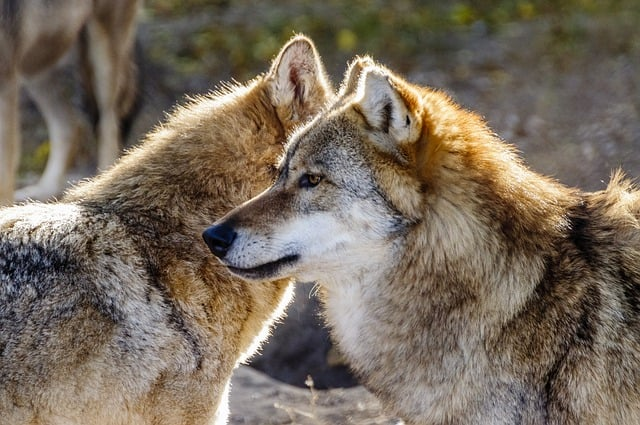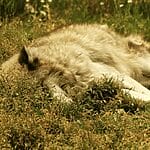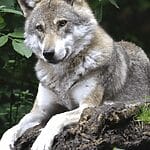Wolves are known for being dangerous predators and have great predatory skills. ‘But what animal eats a wolf?

As apex predators, wolves reside on the top of the food chain and will take down whatever prey is available.
But with this, there are some animals in the wild that kill wolves. Despite their size and strength, they have some animals that are wolf predators.
Gray wolves are the most common wolf species, and their diet varies. Depending on their location, they might eat small animals like rodents, large mammals such as deer, fish, carrion, or even plants.
In this blog, we will discuss which animals prey on these apex predators in the wild in detail.
Wolves Eaten by other animals
Grizzly Bear
With their tremendous strength and size, Grizzly bears can be formidable predators of gray wolves in certain situations. An adult grizzly bear weighs around 400 to 600 pounds, and an adult female nearly 250 to 350 pounds.
Wolves are smaller than grizzlies, and they lack protection from large predators like grizzly bears.
They also hunt alone or in pairs, which makes a grey wolf an easy target for grizzlies looking for a meal. When food is scarce and wolves come into contact with grizzlies, the bears can see the wolves as potential easy prey.
Grizzlies are known to eat wolf pups and even adult wolves in some areas of their habitat. This phenomenon is more common when other food sources have been depleted or during scarcity.
Generally speaking, it’s unlikely that grizzly bears actively hunt wolves, but they may take advantage of the opportunity.
Grizzlies are powerful and opportunistic predators that can eat anything from a mouse to a moose.
On the other hand, wolves have a more specialized diet which typically consists of smaller prey like rodents and deer.
Mountain Lions
Mountain lions eat wolves, but not as a regular part of their diet.
In fact, mountain lions are more likely to be predators of deer than anything else. However, when faced with the opportunity for an easy meal, even a predator such as a wolf, it won’t leave.
The mighty Mountain Lion has been known to take on gray wolves if necessary. This is especially true when resources are scarce or they protect their territory and young ones from wolves.
Though it’s rare for Mountain Lions to take on wolves much bigger than themselves, they have been known to rely on stealth and ambush tactics if the situation calls for it.
Humans Vs. Wolves
Humans have been hunting wolves for centuries. From the gray wolf to the Arctic wolf, these predators have been hunted for their hides, meat, and fur.
In some cases, humans hunt wolves to protect their livestock or themselves from being killed by the wolves. The truth is that human beings often hunt wild animals out of fear and misunderstanding.
Gray wolves, in particular, have long been seen as a threat to livestock and were often shot on sight by farmers and ranchers.
In modern times, wolf hunting has become more regulated as their populations have diminished.
While some people still hunt or trap wolves for sport or to protect their livestock, some humans eat wolves.
Unfortunately, hunting wolves can have a negative impact on the environment due to the disruption of natural ecosystems and food chains.
Siberian Tigers (Amur Tiger) Vs. Wolves
Siberian tigers, also known as Amur tigers, are the largest big cats in the world. They can weigh up to 660 pounds and prey on gray wolves,
Siberian tigers are well-trained to take down even a large wolf. Although they usually prefer to hunt deer, boar, and other animals.
But there are some possible reasons cause of which a Siberian tiger attack a wolf. Like if a wolf attacks tiger cubs, so in some cases, tigers may be trying to protect their offspring. Additionally mostly occurs due to territorial disputes, as well as they are larger in size and strength.
When food is scarce during winter, Siberian tigers sometimes turn to wolves as an alternate food source.
Bears Vs. Wolves
Yes, bears can eat wolves, which is not common. In fact, gray wolves are the prey of bears in certain parts of the world. Bears will also consume wolf pups if they get the chance, although that is rare.
Bears usually target adult wolves due to their size and strength. This is because they can take down a full-grown wolf with ease.
On the other hand, wolves lack this advantage and, as such, cannot fight off a bear attack. It’s not something that happens often, but when it does, it is usually because of hunger or territorial defense.
Scavengers and Wolves
Yes, scavengers do eat wolves in some cases. This behavior typically occurs when grey wolves are sick or injured and unable to defend themselves from their natural predators.
Scavengers such as coyotes, bears, wolverines, and even eagles will exploit the weakened animal’s vulnerability by scavenging its carcass for food.
This type of feeding is called “carrion feeding” and is a common way for scavengers to acquire easy access to nutrition.
Final Words
The wolf is a formidable predator, but it, too, has predators. Mountain lions, bears, and even tiger are animal eats a wolf.
The animal that eats a wolf are predatory animals on their own, but there are some reasons why they prey on wolves. For example, if wolves attack their offspring or are in territorial disputes. Additionally, when food is scarce in winter, the attack on wolves by other predatory animals increases. For more info, you can watch the video below.
Frequently Asked Questions
What animals eat wolves?
Polar bears, grizzly bears, black bears, and the Siberian tiger prey on wolves.
What is a wolf’s worst enemy?
Black bear (Black, Grizzly, Brown, and Kodiak) is a wolf’s worst enemy.
Do lions eat wolves?
Yes, lions do eat wolves.
What Kills Wolves in the Wild?
Polar bears, black bears, and the Siberian tiger kills and eats the wolves in the wild.
- 15 Most Common Animals Living In Ponds - 2024-04-23
- What are the Characteristics Of a Wolf – (Characteristics & Interesting Facts) - 2024-04-23
- Animals That Live In The Abyssal Zone - 2024-04-22








